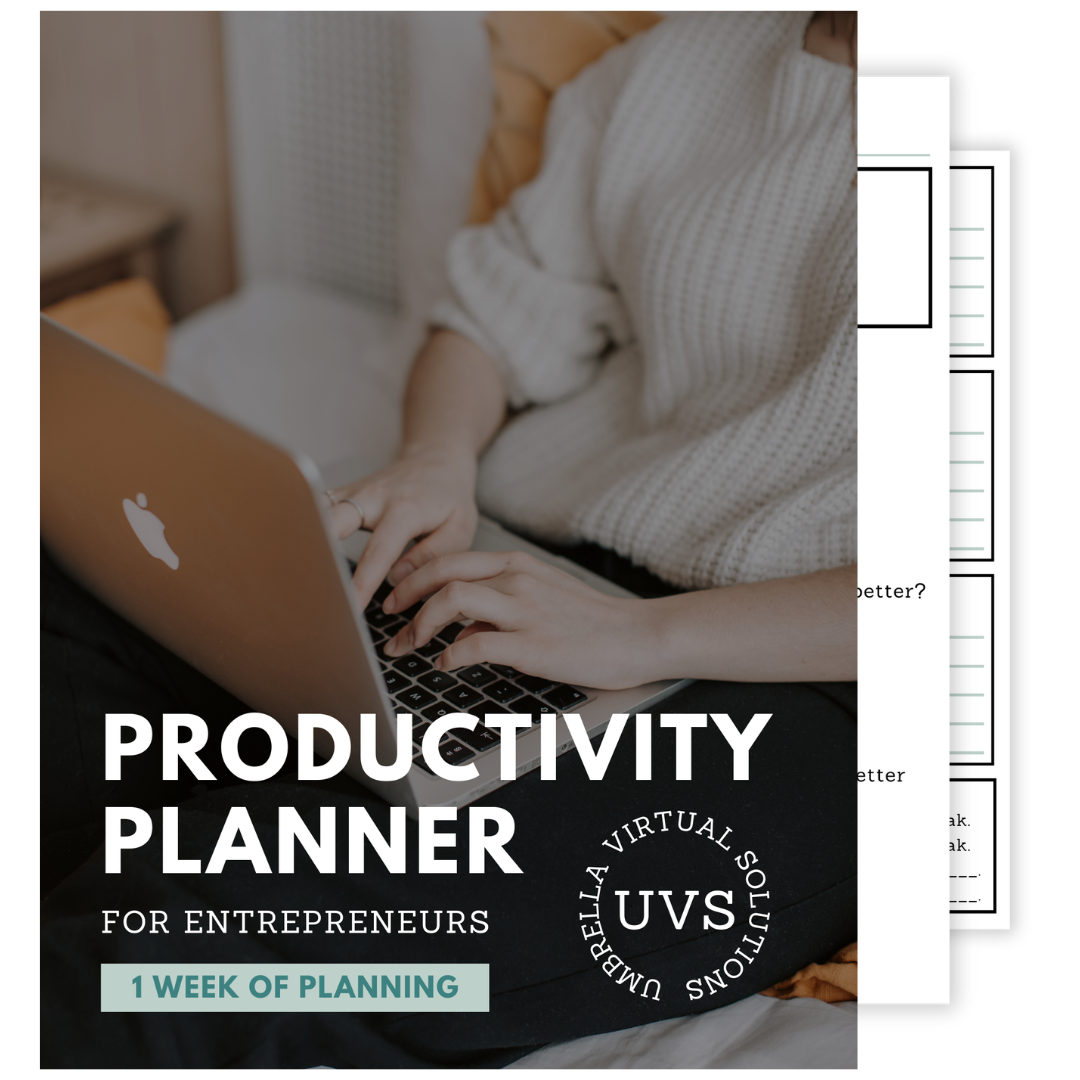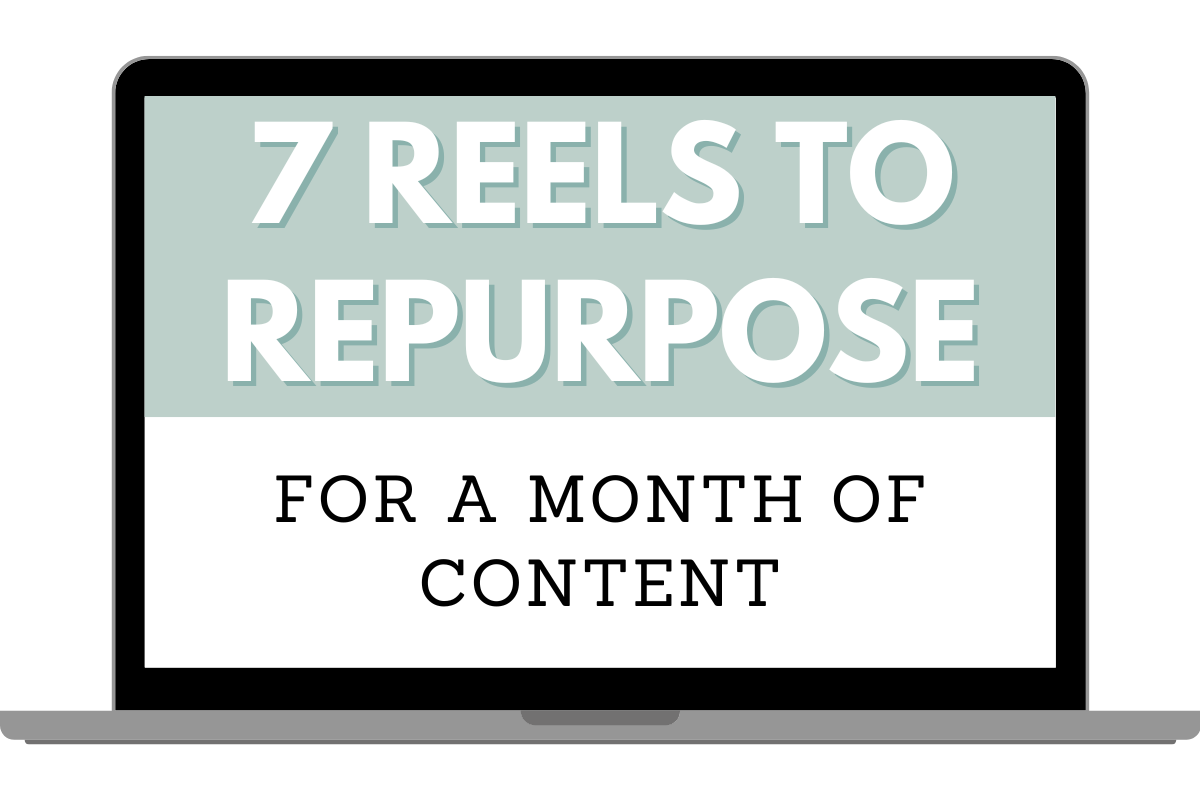
20 Common Online Business Mistakes and How to Avoid Them
Disclosure: This post may contain affiliate links. I may receive a small commission at no additional cost to you if you purchase a product or service using one of the affiliate links within this post. I love all my affiliates and make sure they align with my brand before allowing them into my blog. Thanks for your support!
I love having an online business, but there are definitely times when I look back and think "I probably could have done that better".
And if I could go back, I would have made a whole lot of different decisions.
I learned a whole lot from watching other online entrepreneurs and their businesses, with what worked and what didn't.
But the bottom line is that we learn from the decisions we make.
And there's nothing wrong with making a mistake and learning from it.
But it definitely would be better if we could skip the whole "mistake" part of things, right?
I want to help you save yourself from the stress and frustrations I and so many others have felt in the past.
That's exactly why I've put together this list!
Let's get into some of the most common online business mistakes I see and how you can avoid them.
Online Business Tips and Tricks
Every entrepreneur makes mistakes, it really is part of the journey.
And there is absolutely nothing wrong with making mistakes. I mean, we're all human!
But you're here to avoid as many as possible and I seriously applaud you for that.
Just know that it is more than likely you will make mistakes in the future when it comes to your business, and that's ok!
The whole point of making mistakes is to learn from them.
So no matter if it's a mistake that's on or off this list, please make sure to be kind to yourself and view it as a learning opportunity instead of viewing it as a setback.
Ok, now that we've talked a bit about self-love, let's get on the list!
1. Skipping Market Research
Jumping into a business idea without understanding your target audience or competitors is a huge no-no.
It's one of the very first things you should do when starting a business!
Market research is about understanding the people you're looking to attract (your target audience) and who else is already attracting them.
If you skip this step, you might create products or services that no one is interested in or price them incorrectly.
Avoid it:
Spend time researching your ideal customer and your competition.
I like to look into the most popular podcasts focusing on the same topics as I do to find my competition.
Then I would take a look at their websites to learn a bit more about them and what they offer.
Remember, we're not copying anyone, just looking at how others run their businesses.
And to figure out your ideal customer/target audience, ask yourself these questions:
What's the age range I'm looking to attract?
What's the gender I'm looking to attract?
What type of struggles in my audience am I looking for?
What's the average income I'm looking to attract?
What would interest my ideal customer?
2. No Clear Business Plan
Starting a business without defined goals or a strategy is one of the most common mistakes I see.
And believe it or not, I have been there myself!
It's hard when you're starting to know the kinds of things you may or may not need to do for a successful future.
A business plan is your guide. It helps you stay focused and organized.
Without it, you might waste time and resources on things that don’t align with your goals.
Avoid it:
Create a straightforward business plan that includes your type of content, target audience, revenue streams, and marketing strategies.
The bottom line is you want to break down long-term goals into short-term steps to keep yourself on track.
If you don't know where to start (I know, this is a big one) I've added the link to a blog post where I walk you through creating an online business plan step-by-step!
3. No Clear Niche
Trying to attract everyone attracts no one.
In other words, if you dilute your message, you also dilute your efforts.
A niche lets you speak directly to a specific group of people who are looking for your unique expertise.
Without one, you could blend in with competitors and fail to attract an audience of substance.
Avoid it:
Think about your passions and skills to help you choose a niche.
For example, instead of targeting “online businesses,” you can narrow it down to “online businesses who want to sell digital courses.”
4. Not Building an Email List Early
Only relying on social media to grow your audience can prevent success in the long run.
This is because social media platforms are unpredictable.
Algorithms change, accounts get suspended, and trends shift.
An email list, on the other hand, is a direct way to communicate with your audience.
Avoid it:
Start collecting email addresses right away!
Offer free resources like guides, templates, cheat sheets, or checklists in exchange for sign-ups.
To do this, use an email marketing tool to manage your list and send newsletters regularly.
5. Forgetting About Branding
Having inconsistent or unprofessional branding that confuses potential customers can really change how visitors see your business.
Your brand is how people perceive your business.
Inconsistent branding can make your business feel untrustworthy or unorganized.
Avoid it:
Create a brand identity, including a logo, colour scheme, fonts, and a consistent tone of voice.
Please make sure there is consistency across all platforms, such as your website and your social media posts.
6. No SEO (Search Engine Optimization)
Overlooking search engine optimization limits your website’s visibility.
SEO helps your website rank higher in search engine results, making it easier for potential customers to find you.
Without it, you’re missing out on a lot of organic traffic.
Avoid it:
Learn the basics of SEO, such as keyword research, optimizing page titles and meta descriptions, and creating high-quality, relevant content.
I do all of my SEO myself and learned through research and practice, so it is possible (and quite easy in my opinion).
7. Relying too much on Social Media
Putting all your eggs in the social media basket is something I once again see a whole lot.
Don't get me wrong, social media is a great tool, but it shouldn’t be your only source of traffic or leads.
Platform changes can seriously affect your reach.
That being said, you definitely should still use it, but branching out is always good.
Avoid it:
Branch out your marketing strategy by using things like SEO, email marketing, blogging, or podcasting.
This is so that if one channel isn't doing as well, others can pick up the slack.
8. Inconsistent Posting Schedule
Posting content sporadically can lose audience trust and interest.
When you work hard to build an audience, you definitely don't want to lose them simply because of inconsistency!
Consistency builds trust and keeps your audience engaged.
Avoid it:
Create a content calendar and schedule posts in advance.
I recommend scheduling them on the social media platform itself instead of looking elsewhere.
I love to schedule my pins within Pinterest, and it works well!
9. Underpricing Products or Services
Offering low prices that undervalue your work and hurt your profit will always be something I advise against.
Right from the start I knew I wasn't going to cut my pricing, and guess what? I had clients.
This is because low pricing can attract bargain hunters who may not appreciate your work, and it can also make it difficult to grow your business.
You deserve to be paid fairly for your work, no matter if it's a product or a service.
Avoid it:
Research market rates and consider the value your products or services provide.
And always clearly communicate the value of your marketing.
This way customers understand why your pricing is what it is.
10. Ignoring Customer Feedback
When you overlook the input given by your audience, it's kind of like telling them you don't care about their opinions.
Take feedback as a good thing! It shows you the areas you can improve on and helps you align your business with their needs.
That being said, there can be times when you don't want to do what the feedback says, but there still needs to be a response of some sort.
Avoid it:
Looking for feedback through surveys and reviews helps you to guide the feedback and use it in ways you need, such as for a new product.
Make changes you think could build up your business, and thank your audience for their input to continue growing your relationship.
11. Skipping the Legal Part
I'm not a lawyer, and there are many other bloggers who are lawyers, so I seriously suggest you seek them out if you are looking to make a change with this.
However, I very much suggest you put in the time and research to set up your business legally or use contracts, depending on what you need.
Avoid it:
Once again, I suggest you seek out a lawyer to guide you through what you should do to protect your business legally.
12. Not Testing or Optimizing
Testing isn't something to be afraid of!
It really helps your business reach its fullest potential.
At the same time, if you think a part of your business could be doing better, optimize it!
Avoid it:
Some of my favourite ways to do this are A/B tests on your website, email campaigns, or launch a product and keep an eye on the response, then tweak as you need.
Play around with different headlines, layouts, pictures, and calls to action to see what the audience likes best.
13. Poor Time Management
Spending too much time on low-priority tasks can put a halt to your business growth.
Poor time management can slow down your progress and lead to burnout.
Avoid it:
I will forever and always swear by the Pomodoro technique to help you focus. It's super simple and makes a huge difference!
Also, prioritize your tasks in order of importance, then begin work.
This will guide you on what to do next as you complete one task and start another.
And don't be afraid to say no to distractions.
I like to block out chunks of time where I know I'm working and therefore need to limit my distractions as much as possible.
14. Not Investing in Better Tools
Using free tools can be great! It only becomes a problem when they don’t meet your business needs.
While free tools are fantastic for starting out, sometimes they can limit your efficiency and growth as your business grows.
Avoid it:
I'm not saying to never use anything free, I mean, half the software I use for my business is free.
But when you see one of your free software is holding your business back, it might be time for an upgrade.
Email marketing software, graphic design software, website design software, and even a professional photographer are all things that could be worth the purchase when your business starts growing.
15. No Financial Planning
Mixing personal and business finances or not budgeting properly can seriously affect not only your business but also your personal life.
It can lead to cash flow issues and make it difficult to track your business’s performance.
Avoid it:
Sometimes it's necessary to separate personal and business accounts and use accounting software to track your income and expenses.
Set aside funds for taxes, and regularly review your financial reports to stay on top of your finances.
16. No Content Marketing
When you put time and effort into your content, it would be awful if nobody ever saw it, right?
Content marketing attracts potential customers.
Without it, you miss out on opportunities to connect with your audience.
Avoid it:
Start by creating a marketing strategy for your content.
It doesn't matter the type of content you have, whether it's a blog, podcast, YouTube channel, or social media there are always multiple options for marketing.
Figure out which works best for you and your audience, then go from there!
17. Ignoring Website Design
Having a slow or poorly designed website that drives visitors away will always be something you should work on avoiding.
Not that your website has to be perfect from the get-go, even a simple but well-put-together website will work!
Your website is often the first impression potential customers have of your business, meaning a cluttered or slow site can hurt your business in the long run.
Avoid it:
Taking the time to invest in a clean, user-friendly design that reflects your brand can make a huge difference, and your audience will appreciate it!
Don't forget to optimize your site for mobile devices and check for fast loading speeds for a better user experience.
18. Trying to Do Everything Alone
Refusing to delegate tasks, especially when your business has grown and has many more tasks, can lead to burnout or your business not reaching its fullest potential.
Trying to handle every aspect of your business by yourself can lead to stress and reduced productivity.
Avoid it:
Identify tasks that can be outsourced, such as graphic design, bookkeeping, automation, or customer support.
Hiring freelancers or virtual assistants frees up your time so you can focus on growth.
19. Not Tracking Metrics
Making decisions based on guesswork instead of data can lead to you making decisions that aren't in the best interest of you or your business.
Metrics give insights into what’s working and what’s not.
Without them, you’re essentially flying blind.
Avoid it:
Use tools like Google Analytics, social media insights, and email marketing reports to track your performance.
It does it all for you and taking the time to see what's working and what's not can make a big difference in your business.
20. Quitting Too Soon
Giving up when results aren’t immediate will stop you from reaching your potential.
This takes time!
Building a successful business takes a whole lot more than a week or a month, and early setbacks are part of the process.
Avoid it:
Stay patient.
It will come, you just need to wait!
Set realistic goals and celebrate small wins along the way to keep yourself motivated and remind yourself why you started.
Are You Ready to Be a Successful Online Business Owner?
Thanks for reading this far!
If you want to chat about anything I mentioned in this blog post, I'd love it if you DM me on Instagram!
See you soon!
Isabella

20 Common Online Business Mistakes and How to Avoid Them
Disclosure: This post may contain affiliate links. I may receive a small commission at no additional cost to you if you purchase a product or service using one of the affiliate links within this post. I love all my affiliates and make sure they align with my brand before allowing them into my blog. Thanks for your support!
I love having an online business, but there are definitely times when I look back and think "I probably could have done that better".
And if I could go back, I would have made a whole lot of different decisions.
I learned a whole lot from watching other online entrepreneurs and their businesses, with what worked and what didn't.
But the bottom line is that we learn from the decisions we make.
And there's nothing wrong with making a mistake and learning from it.
But it definitely would be better if we could skip the whole "mistake" part of things, right?
I want to help you save yourself from the stress and frustrations I and so many others have felt in the past.
That's exactly why I've put together this list!
Let's get into some of the most common online business mistakes I see and how you can avoid them.
Online Business Tips and Tricks
Every entrepreneur makes mistakes, it really is part of the journey.
And there is absolutely nothing wrong with making mistakes. I mean, we're all human!
But you're here to avoid as many as possible and I seriously applaud you for that.
Just know that it is more than likely you will make mistakes in the future when it comes to your business, and that's ok!
The whole point of making mistakes is to learn from them.
So no matter if it's a mistake that's on or off this list, please make sure to be kind to yourself and view it as a learning opportunity instead of viewing it as a setback.
Ok, now that we've talked a bit about self-love, let's get on the list!
1. Skipping Market Research
Jumping into a business idea without understanding your target audience or competitors is a huge no-no.
It's one of the very first things you should do when starting a business!
Market research is about understanding the people you're looking to attract (your target audience) and who else is already attracting them.
If you skip this step, you might create products or services that no one is interested in or price them incorrectly.
Avoid it:
Spend time researching your ideal customer and your competition.
I like to look into the most popular podcasts focusing on the same topics as I do to find my competition.
Then I would take a look at their websites to learn a bit more about them and what they offer.
Remember, we're not copying anyone, just looking at how others run their businesses.
And to figure out your ideal customer/target audience, ask yourself these questions:
What's the age range I'm looking to attract?
What's the gender I'm looking to attract?
What type of struggles in my audience am I looking for?
What's the average income I'm looking to attract?
What would interest my ideal customer?
2. No Clear Business Plan
Starting a business without defined goals or a strategy is one of the most common mistakes I see.
And believe it or not, I have been there myself!
It's hard when you're starting to know the kinds of things you may or may not need to do for a successful future.
A business plan is your guide. It helps you stay focused and organized.
Without it, you might waste time and resources on things that don’t align with your goals.
Avoid it:
Create a straightforward business plan that includes your type of content, target audience, revenue streams, and marketing strategies.
The bottom line is you want to break down long-term goals into short-term steps to keep yourself on track.
If you don't know where to start (I know, this is a big one) I've added the link to a blog post where I walk you through creating an online business plan step-by-step!
3. No Clear Niche
Trying to attract everyone attracts no one.
In other words, if you dilute your message, you also dilute your efforts.
A niche lets you speak directly to a specific group of people who are looking for your unique expertise.
Without one, you could blend in with competitors and fail to attract an audience of substance.
Avoid it:
Think about your passions and skills to help you choose a niche.
For example, instead of targeting “online businesses,” you can narrow it down to “online businesses who want to sell digital courses.”
4. Not Building an Email List Early
Only relying on social media to grow your audience can prevent success in the long run.
This is because social media platforms are unpredictable.
Algorithms change, accounts get suspended, and trends shift.
An email list, on the other hand, is a direct way to communicate with your audience.
Avoid it:
Start collecting email addresses right away!
Offer free resources like guides, templates, cheat sheets, or checklists in exchange for sign-ups.
To do this, use an email marketing tool to manage your list and send newsletters regularly.
5. Forgetting About Branding
Having inconsistent or unprofessional branding that confuses potential customers can really change how visitors see your business.
Your brand is how people perceive your business.
Inconsistent branding can make your business feel untrustworthy or unorganized.
Avoid it:
Create a brand identity, including a logo, colour scheme, fonts, and a consistent tone of voice.
Please make sure there is consistency across all platforms, such as your website and your social media posts.
6. No SEO (Search Engine Optimization)
Overlooking search engine optimization limits your website’s visibility.
SEO helps your website rank higher in search engine results, making it easier for potential customers to find you.
Without it, you’re missing out on a lot of organic traffic.
Avoid it:
Learn the basics of SEO, such as keyword research, optimizing page titles and meta descriptions, and creating high-quality, relevant content.
I do all of my SEO myself and learned through research and practice, so it is possible (and quite easy in my opinion).
7. Relying too much on Social Media
Putting all your eggs in the social media basket is something I once again see a whole lot.
Don't get me wrong, social media is a great tool, but it shouldn’t be your only source of traffic or leads.
Platform changes can seriously affect your reach.
That being said, you definitely should still use it, but branching out is always good.
Avoid it:
Branch out your marketing strategy by using things like SEO, email marketing, blogging, or podcasting.
This is so that if one channel isn't doing as well, others can pick up the slack.
8. Inconsistent Posting Schedule
Posting content sporadically can lose audience trust and interest.
When you work hard to build an audience, you definitely don't want to lose them simply because of inconsistency!
Consistency builds trust and keeps your audience engaged.
Avoid it:
Create a content calendar and schedule posts in advance.
I recommend scheduling them on the social media platform itself instead of looking elsewhere.
I love to schedule my pins within Pinterest, and it works well!
9. Underpricing Products or Services
Offering low prices that undervalue your work and hurt your profit will always be something I advise against.
Right from the start I knew I wasn't going to cut my pricing, and guess what? I had clients.
This is because low pricing can attract bargain hunters who may not appreciate your work, and it can also make it difficult to grow your business.
You deserve to be paid fairly for your work, no matter if it's a product or a service.
Avoid it:
Research market rates and consider the value your products or services provide.
And always clearly communicate the value of your marketing.
This way customers understand why your pricing is what it is.
10. Ignoring Customer Feedback
When you overlook the input given by your audience, it's kind of like telling them you don't care about their opinions.
Take feedback as a good thing! It shows you the areas you can improve on and helps you align your business with their needs.
That being said, there can be times when you don't want to do what the feedback says, but there still needs to be a response of some sort.
Avoid it:
Looking for feedback through surveys and reviews helps you to guide the feedback and use it in ways you need, such as for a new product.
Make changes you think could build up your business, and thank your audience for their input to continue growing your relationship.
11. Skipping the Legal Part
I'm not a lawyer, and there are many other bloggers who are lawyers, so I seriously suggest you seek them out if you are looking to make a change with this.
However, I very much suggest you put in the time and research to set up your business legally or use contracts, depending on what you need.
Avoid it:
Once again, I suggest you seek out a lawyer to guide you through what you should do to protect your business legally.
12. Not Testing or Optimizing
Testing isn't something to be afraid of!
It really helps your business reach its fullest potential.
At the same time, if you think a part of your business could be doing better, optimize it!
Avoid it:
Some of my favourite ways to do this are A/B tests on your website, email campaigns, or launch a product and keep an eye on the response, then tweak as you need.
Play around with different headlines, layouts, pictures, and calls to action to see what the audience likes best.
13. Poor Time Management
Spending too much time on low-priority tasks can put a halt to your business growth.
Poor time management can slow down your progress and lead to burnout.
Avoid it:
I will forever and always swear by the Pomodoro technique to help you focus. It's super simple and makes a huge difference!
Also, prioritize your tasks in order of importance, then begin work.
This will guide you on what to do next as you complete one task and start another.
And don't be afraid to say no to distractions.
I like to block out chunks of time where I know I'm working and therefore need to limit my distractions as much as possible.
14. Not Investing in Better Tools
Using free tools can be great! It only becomes a problem when they don’t meet your business needs.
While free tools are fantastic for starting out, sometimes they can limit your efficiency and growth as your business grows.
Avoid it:
I'm not saying to never use anything free, I mean, half the software I use for my business is free.
But when you see one of your free software is holding your business back, it might be time for an upgrade.
Email marketing software, graphic design software, website design software, and even a professional photographer are all things that could be worth the purchase when your business starts growing.
15. No Financial Planning
Mixing personal and business finances or not budgeting properly can seriously affect not only your business but also your personal life.
It can lead to cash flow issues and make it difficult to track your business’s performance.
Avoid it:
Sometimes it's necessary to separate personal and business accounts and use accounting software to track your income and expenses.
Set aside funds for taxes, and regularly review your financial reports to stay on top of your finances.
16. No Content Marketing
When you put time and effort into your content, it would be awful if nobody ever saw it, right?
Content marketing attracts potential customers.
Without it, you miss out on opportunities to connect with your audience.
Avoid it:
Start by creating a marketing strategy for your content.
It doesn't matter the type of content you have, whether it's a blog, podcast, YouTube channel, or social media there are always multiple options for marketing.
Figure out which works best for you and your audience, then go from there!
17. Ignoring Website Design
Having a slow or poorly designed website that drives visitors away will always be something you should work on avoiding.
Not that your website has to be perfect from the get-go, even a simple but well-put-together website will work!
Your website is often the first impression potential customers have of your business, meaning a cluttered or slow site can hurt your business in the long run.
Avoid it:
Taking the time to invest in a clean, user-friendly design that reflects your brand can make a huge difference, and your audience will appreciate it!
Don't forget to optimize your site for mobile devices and check for fast loading speeds for a better user experience.
18. Trying to Do Everything Alone
Refusing to delegate tasks, especially when your business has grown and has many more tasks, can lead to burnout or your business not reaching its fullest potential.
Trying to handle every aspect of your business by yourself can lead to stress and reduced productivity.
Avoid it:
Identify tasks that can be outsourced, such as graphic design, bookkeeping, automation, or customer support.
Hiring freelancers or virtual assistants frees up your time so you can focus on growth.
19. Not Tracking Metrics
Making decisions based on guesswork instead of data can lead to you making decisions that aren't in the best interest of you or your business.
Metrics give insights into what’s working and what’s not.
Without them, you’re essentially flying blind.
Avoid it:
Use tools like Google Analytics, social media insights, and email marketing reports to track your performance.
It does it all for you and taking the time to see what's working and what's not can make a big difference in your business.
20. Quitting Too Soon
Giving up when results aren’t immediate will stop you from reaching your potential.
This takes time!
Building a successful business takes a whole lot more than a week or a month, and early setbacks are part of the process.
Avoid it:
Stay patient.
It will come, you just need to wait!
Set realistic goals and celebrate small wins along the way to keep yourself motivated and remind yourself why you started.
Are You Ready to Be a Successful Online Business Owner?
Thanks for reading this far!
If you want to chat about anything I mentioned in this blog post, I'd love it if you DM me on Instagram!
See you soon!
Isabella





